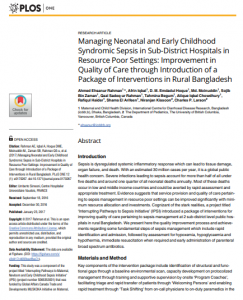
Sepsis is dysregulated systemic inflammatory response which can lead to tissue damage, organ failure, and death. With an estimated 30 million cases per year, it is a global public health concern. Severe infections leading to sepsis account for more than half of all under five deaths and around one quarter of all neonatal deaths annually. Most of these deaths occur in low and middle income countries and could be averted by rapid assessment and appropriate treatment. Evidence suggests that service provision and quality of care pertaining to sepsis management in resource poor settings can be improved significantly with minimum resource allocation and investments. Cognizant of the stark realities, a project titled ‘Interrupting Pathways to Sepsis Initiative’ (IPSI) introduced a package of interventions for improving quality of care pertaining to sepsis management at 2 sub-district level public hospitals in rural Bangladesh. We present here the quality improvement process and achievements regarding some fundamental steps of sepsis management which include rapid identification and admission, followed by assessment for hypoxemia, hypoglycaemia and hypothermia, immediate resuscitation when required and early administration of parenteral broad spectrum antibiotics.